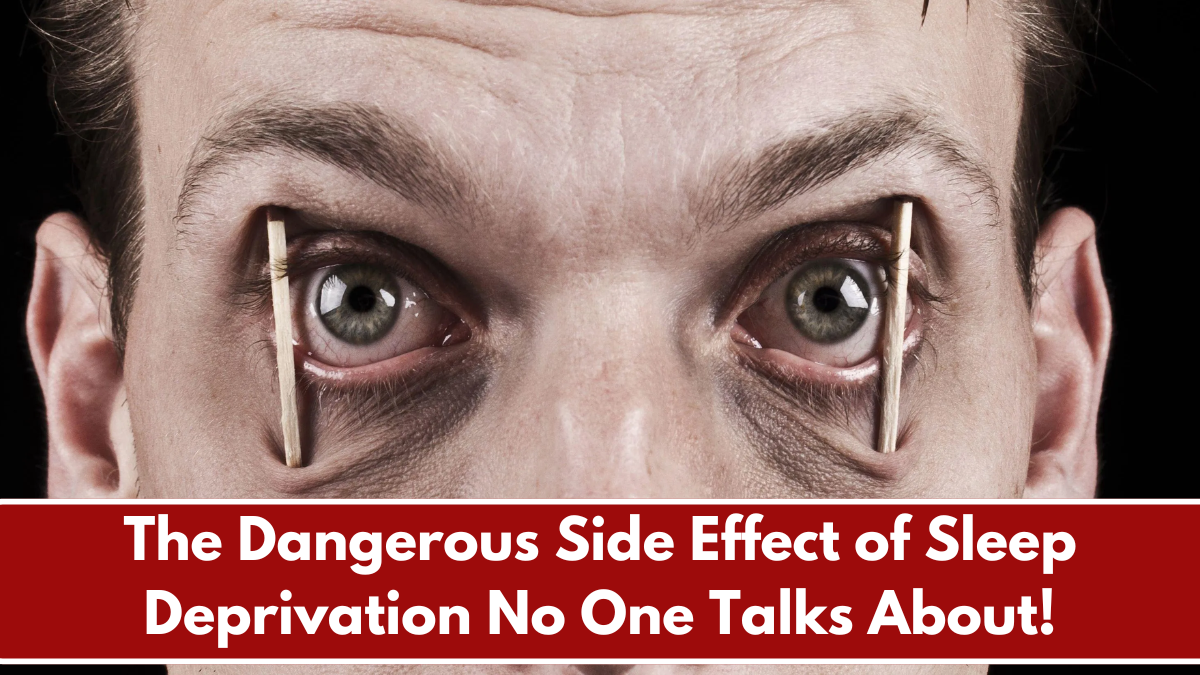Sleep is one of the most critical factors for maintaining overall health, yet millions of people worldwide suffer from chronic sleep deprivation. While most people are aware that lack of sleep can lead to fatigue, mood swings, and decreased productivity, there’s one particularly alarming side effect that often goes unnoticed: permanent brain damage. Yes, you read that right—consistent sleep deprivation can actually lead to irreversible damage in the brain, affecting cognitive function, memory, and even increasing the risk of neurodegenerative diseases. In this article, we will uncover the hidden dangers of sleep deprivation, its impact on the brain, and what you can do to protect yourself.
The Growing Epidemic of Sleep Deprivation
The modern lifestyle has made sleep deprivation a global epidemic. With work deadlines, social media, late-night entertainment, and stress, many people sacrifice sleep in favor of productivity or leisure. Studies show that adults should get 7-9 hours of sleep per night, but a significant portion of the population gets much less than that. According to the Centers for Disease Control and Prevention (CDC), about 35% of adults in the U.S. do not get adequate sleep, and the numbers are even higher among teenagers and young adults. The consequences of chronic sleep deprivation go beyond tiredness and drowsiness—it impacts virtually every system in the body, particularly the brain.
The Unseen Impact: Sleep Deprivation and Brain Damage
One of the most alarming and lesser-known effects of chronic sleep deprivation is its ability to cause permanent damage to brain cells. Research conducted by the University of Pennsylvania found that prolonged wakefulness can lead to the death of neurons in the brain’s locus coeruleus, a region responsible for alertness and cognitive function. Unlike other tissues in the body, neurons do not regenerate once they are lost. This means that chronic sleep deprivation may result in long-term cognitive decline and memory problems.
Another study from the National Institute of Neurological Disorders and Stroke discovered that sleep deprivation causes a buildup of beta-amyloid plaques, the toxic proteins linked to Alzheimer’s disease. Without sufficient sleep, the brain cannot effectively clear out these harmful substances, increasing the risk of neurodegenerative disorders over time.
Sleep Deprivation and Mental Health
Aside from physical brain damage, chronic lack of sleep significantly impacts mental health. Sleep deprivation has been linked to a higher risk of anxiety, depression, and mood disorders. When we sleep, the brain undergoes essential processes that regulate emotions and stress. Without adequate rest, individuals may experience heightened irritability, difficulty managing emotions, and increased susceptibility to psychiatric conditions.
A lack of sleep also affects decision-making and impulse control, making individuals more prone to risky behaviors, poor financial decisions, and even dangerous driving habits. In fact, studies have shown that sleep-deprived individuals perform similarly to those who are legally intoxicated, making it a major public safety concern.
The Connection Between Sleep Deprivation and Physical Health
Beyond the brain, sleep deprivation wreaks havoc on the body. Chronic sleep loss is associated with an increased risk of heart disease, high blood pressure, diabetes, and obesity. When the body doesn’t get enough rest, it produces higher levels of cortisol (the stress hormone), which can lead to inflammation, metabolic disturbances, and weakened immune function. Additionally, sleep-deprived individuals often experience hormonal imbalances, leading to increased hunger and cravings for unhealthy foods, which contribute to weight gain and metabolic disorders.
How Much Sleep Do You Actually Need?
The optimal amount of sleep varies by age and individual needs. The National Sleep Foundation provides the following general guidelines:
- Newborns (0-3 months): 14-17 hours
- Infants (4-11 months): 12-15 hours
- Toddlers (1-2 years): 11-14 hours
- Preschoolers (3-5 years): 10-13 hours
- School-age children (6-13 years): 9-11 hours
- Teenagers (14-17 years): 8-10 hours
- Adults (18-64 years): 7-9 hours
- Older adults (65+ years): 7-8 hours
If you’re consistently sleeping less than the recommended amount, it may be time to evaluate your habits and make sleep a priority.
How to Improve Your Sleep Quality
Improving sleep quality isn’t just about getting more hours; it’s about ensuring deep, restorative sleep. Here are some practical tips to improve your sleep:
- Stick to a Sleep Schedule: Go to bed and wake up at the same time every day, even on weekends, to regulate your body’s internal clock.
- Limit Screen Time Before Bed: The blue light emitted from phones, tablets, and computers interferes with melatonin production, making it harder to fall asleep.
- Create a Relaxing Bedtime Routine: Reading, taking a warm bath, or practicing meditation can signal your body that it’s time to wind down.
- Avoid Caffeine and Alcohol Late in the Day: Both substances can disrupt sleep quality and should be avoided in the evening.
- Exercise Regularly: Physical activity during the day promotes better sleep at night, but avoid intense workouts close to bedtime.
- Optimize Your Sleep Environment: Keep your bedroom cool, dark, and quiet. Investing in a comfortable mattress and pillows can also make a big difference.
- Manage Stress: Chronic stress is a major contributor to sleep problems. Practicing relaxation techniques like deep breathing, yoga, or journaling can help reduce stress before bed.
Conclusion
Sleep deprivation is far more than just an inconvenience—it has serious consequences for both brain health and overall well-being. The fact that chronic sleep loss can lead to permanent brain damage and increase the risk of neurodegenerative diseases is a wake-up call for many. Unfortunately, in today’s fast-paced society, sleep is often sacrificed for work, entertainment, and social obligations. However, prioritizing sleep is one of the most effective ways to safeguard your health, improve cognitive function, and enhance overall quality of life.
If you’ve been neglecting your sleep, now is the time to take action. By making small but consistent changes to your daily habits, you can protect your brain and body from the long-term consequences of sleep deprivation. Don’t wait until it’s too late—start prioritizing sleep today for a healthier, happier future.
FAQ’s:
1. What is sleep deprivation, and how does it affect the body?
Sleep deprivation occurs when an individual consistently gets less sleep than their body needs, leading to a range of negative health effects. While occasional lack of sleep might cause fatigue and reduced focus, chronic sleep deprivation can impact nearly every system in the body. It weakens the immune system, disrupts hormonal balance, impairs cognitive function, increases stress levels, and raises the risk of chronic diseases like heart disease and diabetes. Over time, the effects of sleep deprivation can accumulate, causing long-term harm to both physical and mental well-being.
2. What is the most dangerous side effect of sleep deprivation that people don’t talk about?
One of the most overlooked yet dangerous side effects of sleep deprivation is its impact on brain shrinkage and long-term cognitive decline. Studies show that chronic lack of sleep can cause the brain to lose gray matter, leading to an increased risk of neurodegenerative diseases like Alzheimer’s and dementia. The brain uses sleep to repair and detoxify itself, clearing out harmful waste products accumulated throughout the day. Without sufficient sleep, these toxins build up, accelerating memory loss, cognitive decline, and an increased risk of mental disorders.
3. How does sleep deprivation affect mental health?
Lack of sleep has profound effects on mental health, contributing to increased anxiety, depression, and mood swings. When the brain doesn’t get enough rest, it struggles to regulate emotions properly, making individuals more prone to irritability, stress, and even paranoia. Research has found that people who consistently get less than six hours of sleep per night are significantly more likely to experience mental health disorders, with a higher risk of suicidal thoughts and severe mood disorders. Sleep is essential for emotional resilience, and chronic deprivation can make even minor stressors feel overwhelming.
4. Can sleep deprivation increase the risk of heart disease?
Yes, sleep deprivation is strongly linked to cardiovascular disease. When you don’t get enough sleep, your blood pressure remains elevated for extended periods, increasing the risk of hypertension, heart attacks, and strokes. Sleep is crucial for heart health because it helps regulate stress hormones and inflammatory markers. Over time, poor sleep quality can lead to increased arterial plaque buildup, causing blockages in the heart. Studies suggest that individuals who sleep less than six hours a night have a much higher risk of heart disease than those who get seven to eight hours regularly.
5. How does lack of sleep contribute to weight gain?
Sleep deprivation significantly affects metabolism and appetite regulation. When you don’t sleep enough, your body produces more ghrelin (the hunger hormone) and less leptin (the hormone that signals fullness). This imbalance leads to increased cravings for unhealthy, high-calorie foods, particularly sugary and fatty foods. Additionally, lack of sleep slows down metabolism and reduces energy levels, making people less likely to exercise. Over time, these factors contribute to weight gain and an increased risk of obesity, which in turn raises the risk of diabetes and other metabolic disorders.
6. Can sleep deprivation weaken the immune system?
Absolutely. Sleep is critical for a healthy immune system because it allows the body to repair itself and fight off infections. When you don’t get enough sleep, your body produces fewer infection-fighting antibodies and immune cells, making you more susceptible to illnesses like colds, flu, and even chronic conditions such as cancer. Sleep deprivation also increases inflammation in the body, further weakening immune defenses. People who consistently get less than six hours of sleep are significantly more likely to catch viruses and have longer recovery times when sick.
7. How does lack of sleep affect the brain’s ability to detoxify?
During deep sleep, the brain undergoes a crucial detoxification process called the glymphatic system, which clears out harmful waste products, including beta-amyloid plaques linked to Alzheimer’s disease. When you don’t get enough sleep, this waste accumulates, leading to increased brain inflammation and a greater risk of cognitive decline. Sleep deprivation also reduces the brain’s ability to process and store new information, leading to poor memory retention and slower cognitive function. Long-term sleep deprivation may contribute to neurodegenerative disorders and permanent brain damage.
8. Is microsleep a serious problem caused by sleep deprivation?
Yes, microsleep is a dangerous phenomenon that occurs when the brain briefly shuts down for a few seconds, even while a person is awake. It often happens without warning, leading to momentary blackouts, which can be extremely dangerous, especially while driving or operating heavy machinery. Many car accidents and workplace injuries are caused by people experiencing microsleep due to chronic sleep deprivation. Even if you think you are functioning normally, your brain may force these brief shut-offs when it reaches extreme levels of exhaustion.
9. Can sleep deprivation lead to premature aging?
Yes, chronic sleep deprivation accelerates the aging process in multiple ways. It reduces the body’s ability to repair skin cells, leading to dull skin, dark circles under the eyes, and early wrinkles. Sleep deprivation also increases cortisol (the stress hormone), which breaks down collagen and elastin, two proteins essential for maintaining youthful skin. Additionally, poor sleep affects the body’s ability to produce growth hormone, which is necessary for cell regeneration and repair. Over time, chronic lack of sleep can make a person look older than they actually are.
10. What are some ways to improve sleep quality and prevent sleep deprivation?
Improving sleep quality requires making conscious lifestyle changes. Here are some effective strategies:
- Stick to a sleep schedule: Go to bed and wake up at the same time every day, even on weekends.
- Create a bedtime routine: Engage in relaxing activities like reading, meditation, or warm baths before bed.
- Avoid screens before bedtime: Blue light from phones, TVs, and computers disrupts melatonin production, making it harder to fall asleep.
- Limit caffeine and alcohol: Both can interfere with deep sleep cycles and cause nighttime awakenings.
- Optimize your sleep environment: Keep the bedroom dark, quiet, and cool for better sleep quality.
- Get regular exercise: Physical activity during the day promotes deeper, more restorative sleep at night.
- Manage stress: Practicing mindfulness, deep breathing, or journaling can help calm the mind before bed.
By prioritizing good sleep hygiene and making necessary lifestyle adjustments, you can prevent the harmful effects of sleep deprivation and improve your overall well-being.



